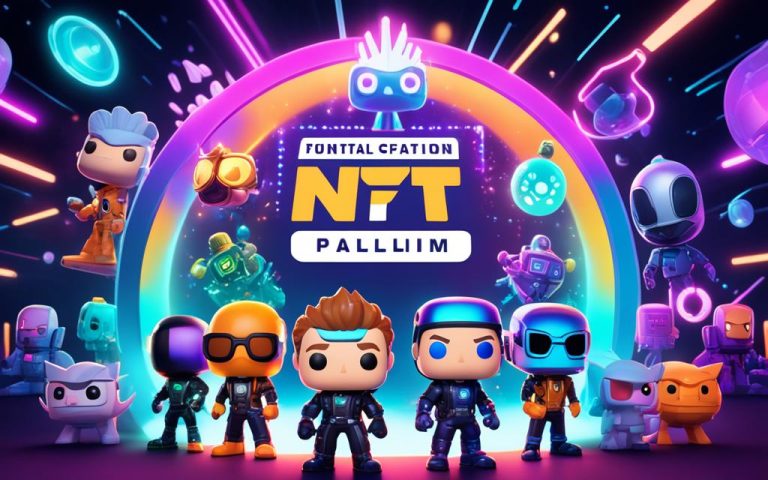Blockchain technology and cryptocurrencies are changing industries rapidly. In 2021, crypto transactions soared to $15.8 trillion. That’s a 550% jump. But with big growth, concerns about NFT scams have also grown.
Bitcoin and Ethereum have seen huge investments. Billions are flowing into these digital assets from both personal and group investors. Yet, the crypto world is very up and down. This instability affects non-fungible tokens (NFTs) a lot.
NFTs are unique digital items like art, music, and videos. They have become very popular. But, there have been many scams and frauds in this new market.
Knowing the risks with NFTs is key. One example is TerraUSD, a stablecoin that crashed. It showed how shaky the crypto market can be. It’s sometimes seen as a risky bet with few rules.
Groups are looking into NFT fraud and trying to make things safer. Rug Pull Finder found about 200 scams costing over $1.3 billion. Crypto sleuth Zachxbt has also found over 100 scams.
The growth in the crypto market is clear. NFT investments jumped from $106 million in 2020 to $44.2 billion in 2021. But with big opportunities come big risks. So, buyers need to be careful and do their homework.
As the crypto world grows, rules must too. Better regulations and security can protect investors. This will help make the digital asset market safer and more open.
Learn more about NFT scams and how to stay safe. Check out articles from Freakonomics, ABC News, and Brett Wilson Solicitors.
Understanding NFT Fraud and Scams
NFTs have opened new doors for artists, collectors, and investors. But as their popularity grows, so does NFT fraud and scams. It’s vital to be alert and know the risks in the NFT market.
“Rug-pull” scams are common where creators abandon a project after collecting funds, leaving investors with nothing. This scheme heavily promotes an NFT project to draw in buyers. When enough money is collected, the creators disappear.
Phishing scams are another big issue. Scammers trick people into giving away wallet information or personal details. They use fake links or emails. To avoid this, always check who you’re dealing with and keep your info safe.
DeFi wallets, such as MetaMask, offer control but can be insecure. Many lack strong security like Two-Factor Authentication (2FA), making them easy targets. Users should adopt 2FA and look for safer wallet options.
Protecting Your NFT Investments
To keep your NFT investments safe, follow these tips:
- Use Two-Factor Authentication (2FA) for an extra security layer. This step makes unauthorized access much harder. [^3^]
- Keep your login details private. Use different passwords for different sites and change them regularly.
- Do your homework before buying an NFT. Check images, source, and project validity to avoid scams. [^2^]
- Stay up-to-date with NFT market news, especially about scams. Knowing the risks helps you protect your assets. [^2^]
By being vigilant and informed, you can enjoy the NFT world more safely. These steps reduce the chance of falling into scams.
“Be wary of phishing scams. False links and emails are common tricks to steal your data. Always check the legitimacy of sites and platforms before any NFT transactions.”
| Statistics | Value |
|---|---|
| The first-ever tweet on Twitter sold as an NFT | $2.9 Million[^1^] |
| Most expensive NFT from the Bored Ape Yacht Club | $3.8 Million[^1^] |
| Most expensive NFT from Crypto Punks | $11.75 Million[^1^] |
| An NFT collector’s stolen NFTs | $2.2 Million[^1^] |
| Value converted to ether for an NFT investment | £5,000[^1^] |
The NFT world is thrilling but comes with risks. Stay careful, guard your assets, and enjoy this innovative tech with responsibility.
Sources:
https://www.fraud.com/post/nft-scams-a-real-life-story
https://stackbrowser.com/blog/are-nfts-scams
https://manhattanda.org/nft-scams-and-frauds/
Conclusion
The NFT market is full of chances for both creators and collectors. Yet, it’s not free of danger like fraud and scams.
People in the NFT world should focus on being aware and safe. Knowing how to avoid scams and what the rules are helps stay safe. Law agencies are also working to catch those breaking the rules.
It is key for users to learn and make smart choices. Looking into projects deeply, checking if things are real, and being safe online helps a lot. This way, it’s harder to get tricked by scams.
The NFT world keeps changing, and keeping it safe is a job for everyone. Working together, regulators, users, and tech folks can make a strong and creative NFT market. All while keeping everyone’s interests safe.
FAQ
Are NFTs a legitimate form of investment?
NFTs are getting popular for owning digital stuff, but there’s been fraud in the NFT world. It’s key to check an NFT’s real deal before putting money into it.
How can users protect themselves from NFT scams?
Stay sharp about the risks and do your homework on NFT projects. Don’t click weird links or emails. Always use secure platforms and wallets, and keep your personal info and wallet secret.
What are some common NFT scams?
The “rug-pull” scam is where an NFT gets hyped up and then the project ditches, leaving investors with nothing. Phishing scams trick you by pretending to be legit to steal your wallet info and personal details.
Is the crypto market regulated?
The crypto space is still widely unregulated, making it risky. Scammers can take advantage of this. Authorities are working harder to catch these fraudsters and are trying to enforce stricter rules around NFTs.
How can users safeguard their crypto assets?
Secure your crypto by using wallets with extra security like Two-Factor Authentication. Stay updated on blockchain tech. Always put security first to keep your crypto safe from hackers and thieves.



















